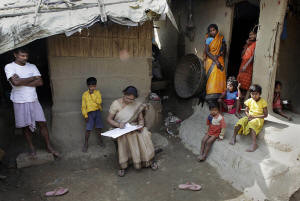India will include caste details in its next census
[May 01, 2025]
By RAJESH ROY and SHEIKH SAALIQ
NEW DELHI (AP) — India will include caste details in its next census, in
a move likely to have sweeping socio-economic and political
ramifications for the world's most populous country.
Information Minister Ashwini Vaishnaw didn’t say when the census would
begin when he announced it would include caste information Wednesday. He
said the decision demonstrated New Delhi’s commitment to the “values and
interests of the society and country.”
The count is likely lead to demands to raise the country’s quotas that
reserve government jobs, college admissions and elected offices for some
categories of castes, especially for a swathe of lower and intermediate
castes that are recognized as Other Backward Classes. India’s current
policy caps quotas at 50%, with 27% reserved for OBCs.
Caste is an ancient system of social hierarchy in India and is critical
to Indian life and politics. There are hundreds of caste groups based on
occupation and economic status across India, particularly among Hindus,
but the country has limited, or outdated data on how many people belong
to them.
Successive Indian governments have resisted updating caste data, arguing
that it could lead to social unrest. But its supporters say detailed
demographic information is necessary to properly implementing India’s
many social justice programs.
Colonial ruler Britain began an Indian census in 1872 and counted all
castes until 1931. However, independent India since 1951 only counted
Dalits and Adivasis, who are referred to as scheduled castes and tribes,
respectively. Everyone else’s caste was marked as general.

The next once-in-a-decade population survey was originally due in 2021,
but has been delayed mainly by the COVID-19 pandemic and logistical
hurdles. The last official census in 2011 counted 1.21 billion people,
of which 2011 million were scheduled castes and 104 million were
scheduled tribes.
The announcement comes months ahead of a crucial election in India’s
poorest state of Bihar, where caste is a key issue. Modi’s party runs a
coalition government in Bihar.
[to top of second column]
|

Mahesh Shah, left, stands as his family members look while census
worker Rumima Das, writes the information on a paper on the first
day of the national census at Ramsingh Chapori village, east of
Gauhati, India, April 1, 2010. (AP Photo/Anupam Nath, File)

The opposition and Modi’s partners have pressed the government to
count caste in a new census. Modi’s Hindu nationalist party has in
the past opposed the idea of counting people by caste, saying it
would deepen social divisions in the country.
Opposition leader Rahul Gandhi of the Congress Party wrote on X that
“It is clear that the pressure we put on the government for Caste
Census has worked."
Two Indian states, northern Bihar and southern Karnataka, have
already released caste surveys, both showing a higher number of
backward castes and prompting demands to raise quotas.
Two southern states, Andhra Pradesh and Telangana, are also planning
to undertake similar surveys.
Vaishnaw said including caste details in the national census would
improve transparency, while adding that some states ruled by
opposition parties have done their own caste surveys for political
gain.
Fortunes of many of these political parties, including Prime
Minister Narendra Modi's ruling Bharatiya Janata Party, depend on
alliance of castes, particularly those in the OBC category.
On Wednesday, Amit Shah, India’s powerful home minister, called the
move “historic” and said it “will empower all economically and
socially backward sections.”
All contents © copyright 2025 Associated Press. All rights reserved |